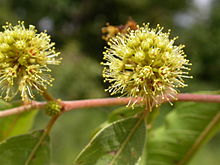Anogeissus leiocarpus
| Anogeissus leiocarpa | |
|---|---|
 |
|
| Anogeissus leiocarpa flowers in Burkina Faso | |
| Scientific classification | |
| Kingdom: | Plantae |
| Clade: | Angiosperms |
| Clade: | Eudicots |
| Clade: | Rosids |
| Order: | Myrtales |
| Family: | Combretaceae |
| Genus: | Anogeissus |
| Species: | A. leiocarpa |
| Binomial name | |
|
Anogeissus leiocarpa (DC.) Guill. & Perr. |
|
Anogeissus leiocarpa (African birch; Bambara: ngálǎma) is a tall deciduous tree native to savannas of tropical Africa. It is the sole West African species of the genus Anogeissus, a genus otherwise distributed from tropical central and east Africa through tropical Southeast Asia.A. leiocarpa germinates in the new soils produced by seasonal wetlands and grows at the edges of the rainforest, although not in the rainforest, in the savanna, and along riverbanks forming gallery forests. The tree flowers in the rainy season, from June to October. The seeds, winged samaras, are dispersed by ants.
It is one of the plants used to make bògòlanfini, a traditional Malian mudcloth. Small branches with leaves are crushed to make one of the yellow dyes. The inner bark of the tree is used as a human and livestock anthelmintic for treating worms, and for treatment of a few protozoan diseases in animals, nagana (an animal trypanosomiasis), and babesiosis. The inner bark is used as a chewing stick in Nigeria and extracts of the bark show antibacterial properties. The stem barks contains castalagin and flavogallonic acid dilactone.
...
Wikipedia
